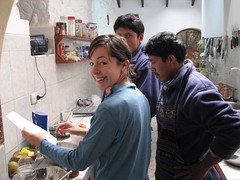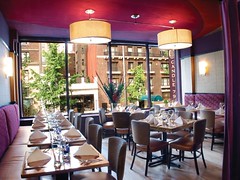
I found this really interesting sounding sustainable organic farm in Ecuador called Never Land. It’s run by an American woman named Tina who lives there with a local Ecuadorian named Killo. A couple of local paid workers come during the week to help with the workload. They have a bio-dynamic garden and are doing alternative building. I read someone else’s account on their blog and it sounded like a nice break: work on a farm, be in the middle of nowhere and have a community.
I communicated via e-mail to Tina and planned our arrival and printed the directions (there are 3 buses a day that take you to a small village, 45 minutes outside of Vilcabamba, then you hike for 45 minutes through a valley). A few days before we left town, I emailed Tina to confirm and she told me that she had to go back to the US for some family stuff, but we were still welcome to come and live at the farm. The website states that they don’t charge anything, we work for our food and lodging and help carry food into the farm.

So we headed there, I with perhaps too high expectations of a welcoming, friendly community and projects to work on where we could learn as well as help them become sustainable. My expectations were too high. The land is beautiful, located next to a river that if you hike upstream for 2 hours you find a waterfall. The land was previously owned by Johnny Lovewisdom, a very interesting guy who wrote some crazy books and believed in eating only fruits. He also suffered a lot of health problems, not sure if trying to live off papaya helped or hurt his health. Anyways, Tina now owns the land and runs a WWOOF type project where people can come and help and stay. We arrived there at dusk, were offered dinner and were shown our lodging, which was a bamboo bed (I don’t recommend it) and a mosquito net over it.
I’ll just get to the point and summarize our experience. We were the ONLY volunteers there. The following morning we asked what we could do, how we could help, what were the projects and we got vague answers like, we don’t need help right now. So we just followed around the paid guy and helped him move rocks the first day and I got bored and annoyed. They are building a round stone house for a friend of Tina who’s going to move there but when questioned no one would explain the specifics of the house, why it’s sustainable or any sort of knowledge about what we were doing or why. I got frustrated so I went back to the main house and helped Killo prepare lunch, which is where I learned he was leaving us for a few days to go get his son. I went to town with him on his horse and rode the horse back in the rain, which was a fun experience (the path is narrow with steep drop-offs).
The next day the paid guy didn’t show up and we didn’t know what to do, so Matt macheted the paths and I made bread and cooked the meals for us and the paid guy who was living there for the week. Killo, who supposedly ran the farm was always vague when we asked to help and never gave us direction or a project. We felt unnecessary and alone. There was no community and when the workers were there, they barely talked at all, even when we asked questions, they answered in short answers. There was a list next to the kitchen that said projects for 2007 and it included macheteing the path and feeding the 3 dogs and 3 cats.
So all I can think is that Tina must organize the volunteers and make it seem like a welcoming community because without her, I didn’t have any experiences there that I read of. There was no organization or planning. We moved rocks the first day and next 4 days no one worked on the house again. We helped weed the garden because we followed the paid guy there and we helped week the leeks. Matt asked what was in the other rows and he didn’t or wouldn’t tell us, so when we were left without supervision we couldn’t even weed on our own because most of the rows were not labeled and we weren’t told what was a weed and what wasn’t. It was quite frustrating because we wanted to help and learn and share and we basically were ignored. I would have felt different if the intention was to go and hang out and read books and relax, but we felt we should help and couldn’t. So we basically gave up. I tried to enjoy cooking and I tried to sleep through the night (the dogs are barkers at anything) and I definitely enjoyed the scenery. But we were lonely. Killo left us 4 of the 7 nights we were on the farm and we were left totally alone on the farm for a few days in a row. So much for community farming.

I think the thing that bothered me the most was that the website says there’s no fee (one of the reasons we decided to go), but then we get there and there’s a sign on the wall, next to the exciting projects that says all volunteers must pay $15 US per week to stay there…which doesn’t seem fair to have no advance warning. BUT we were never told of this fee by anyone on the farm during our week or Tina via email. Our last night Killo told us we had to pay $25 US per week per person to cover our expenses and I just about flipped out. We have been having repeated experiences in Peru and Ecuador of people trying to rip us off by telling us a different price for food and lodging and they always do it at the end. These people won’t even be straightforward with us. What a horrible thing to be on a farm for a week, feeling useless and unwanted and then have them ask for money on the last day with no warning? It’s SO wrong and the next morning we showed Killo the sign on the wall that says $15 and he said it was from last year (even though it clearly says 2007) and that the website hasn’t been updated and he thought Tina told us. Jeez, I would have thought twice about going before paying $50 for a week whether we were working or not. We paid about $50 a week to have our own room, bathroom, hot water and shared kitchen in Huanchaco and we didn’t have to work on a farm. So we fought his attempts to take advantage of the gringos and decided $15 a week is fair for the food but unfair in their methods of asking for it and left. One week there was too much. I got to read “The World According to Garp,” which is a bit depressing and moved rocks, baked bread, took a few hikes and weeded leek rows.
While in Vilcabamba relaxing and recovering from our disappointment and anger at the money thing we found a sign for another sustainable farm of sorts, which sounds exactly like what we had in mind. It’s called Sacred Suenos and is 2 hours by foot from Vilcabamba. If anyone checks it out, let me know if it’s anything better than what I experienced.






